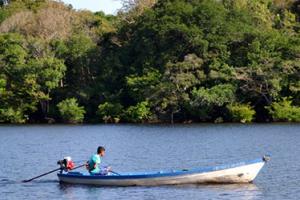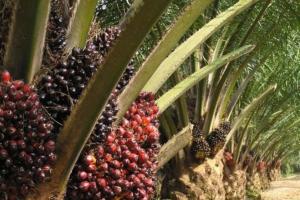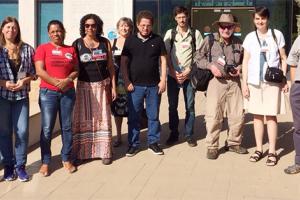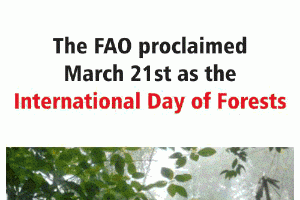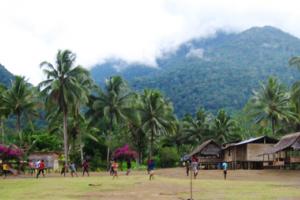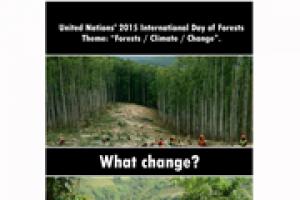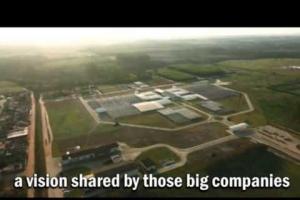Dear Guadalupe,
My name is Guilherme and I’m the coordinator of the Civil Society and Producer Organizations Team in FAO’s Unit of Partnerships (OPCP) under the Office for Partnerships, Advocacy and Capacity Development (OPC).
FAO acknowledges receipt of the Open Letter regarding FAO’s definition on forests, and took note your critical remarks.
21/03/17
March 21st, has been proclaimed by the FAO as the International Day of Forests. But the FAO forest definition considers a tree monoculture plantation as a “forest”. By allowing this, the UN institution, is undermining the lives of millions of people from around the world whose livelihoods depend of forests and whose territories are invaded and threatened by tree monocultures.
On 21 March, hundreds of organizations from around the world are sending a letter to the FAO demanding-once again- that its forest definition recognize the diversity that characterizes forests and exclude monocultures from this definition.
Other information
6 April 2017
On 21 March 2017, Malaysian NGOs The Consumers’ Association of Penang (CAP) and Sahabat Alam Malaysia (SAM) joined worldwide action against the UN Food and Agriculture Organisation's (FAO) forest definition. About 200 groups have renewed the call for the FAO to amend its misleading definition of forests which has allowed industrial tree plantations to expand.
Action alerts
17 March 2017
Press Release
March 21, 2017
FAO definition must recognize that plantations are not forests!
Other information
14 March 2017
We have created this animated gif showing why the FAO must change its forest definition, to be shared on the social networks. Please feel free to do so!
10 March 2017
March 21st, has been proclaimed by the FAO as the International Day of Forests. But the FAO forest definition considers a tree monoculture plantation as a “forest”. By allowing this, the UN institution, is undermining the lives of millions of people from around the world whose livelihoods depend of forests and whose territories are invaded and threatened by tree monocultures.
Action alerts
8 February 2017
Dear friends,
March 21st, the International Day of Forests, is around the corner! As you may recall, on that day we will be sending a letter to the FAO demanding again that it changes its forest definition which allows an industrial tree monoculture to be considered a forest.
20 January 2017
Dear friends,
March 21st, the International Day of Forests, is around the corner! As you may recall, on that day we will be sending a letter to the FAO demanding again that it changes its forest definition which allows an industrial tree monoculture to be considered a forest.
Action alerts
21 September 2016
This open letter, calling on the FAO to revise its forest definition, will be sent to the FAO next March 21 when the International day of Forests is commemorated.
If your organization has not yet signed, we invite you to support the letter. Please send an email to fao2017@wrm.org.uy and include your organization’s name and country.
Signatures as of March 16, 2017
Multimedia
21 March 2016
On the 21st of March, International Day of the Forests, the FAO has launched another nice video. This year the video is about forests and water. Did you notice the video does not include any monoculture tree plantations, even though FAO considers them as forests? How would look such a video if coherent with FAO´s forest definition?
Publications
20 March 2015
United Nations’ 2015 International Day of Forests. Theme: “Forests / Climate / Change”. What change?
Download as pdf here.
The aim of this document is to respond to this year’s campaign for March 21 carried out by the Food and Agriculture Organization of the United Nations (FAO). In a very short video, FAO highlights forests’ capacity to trap CO2 and suggests: “Sustainably managed forests are the frontline against climate change.”
Multimedia
20 March 2015
This two-minutes video is a rebuttal of the one-minute video produced by FAO for International Day of Forests.
The video aims to challenge the FAO video for March 21, which narrowly and erroneously views forests as if they were a “storage facility” for wood and carbon.
width="480" height="360" frameborder="0" allowfullscreen="allowfullscreen">
